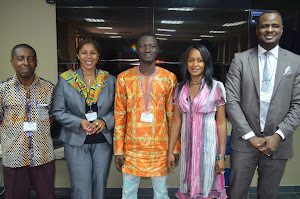BY EDMUND SMITH-ASANTE
In order to arrest its low sanitation coverage woes, Ghana has adopted the Community-Led Total Sanitation (CLTS) mode for its rural communities.
With the CLTS method, a community is made to lead in behavioural change through mapping out of defecating routes and engaging in a walk of shame, during which the reality and consequences of their open defecation behaviour is brought to light.
After this, members of the community are educated on the importance of observing proper sanitation practices and assisted technically to build their own latrines with inexpensive materials, so they desist from defecating openly (currently about 22% of Ghanaians practice open defecation – according to the Ghana Water and Sanitation Monitoring Platform (WSMP), “There was a marginal 1.3% decline in open defecation from 24.4% in 2006 to 23.1% in 2008.”)
Disclosing Ghana’s decision to employ the CLTS approach in dealing with the country’s poor sanitation coverage, Mr. Kweku Quansah, a Programme Officer of the Environmental Health and Sanitation Directorate (EHSD), said a consultant had already been contracted by government with support from the United Nations Children’s Fund (UNICEF), known as Simon BB to assist the country roll out a very effective programme.
“Simon BB is a world-class consultant in CLTS and is trying to develop a classic roll out plan for a scale up plan for CLTS in Ghana,” he said in an exclusive interview with ghanabusinessnews.com in Kumasi on Friday.
Mr. Quansah divulged that Ghana has been able to develop an Open Defecation Free (ODF) guideline and has invited Camal Karl, the initiator of CLTS, “to come and really build the capacity of CLTS facilitators.”
He explained that Dr. Camal Karl is the initiator and originator of Community-Led Total Sanitation approach, and is coming to Ghana by the second week in December to build the capacity of CLTS facilitators in Ghana.
“This is going to be supported by UNICEF and we also have what we call the ODF Community Awards – this year, as part of the World Toilet Day on 19th of November, we are going to give awards to communities which have been able to achieve open defecation free and it is very very crucial to us, because that is one of the issues in Community-Led Total Sanitation,” he intimated.
He stated further that the President of Ghana will also launch the country’s Sanitation Policy on November 16, 2010 and on the same day outdoor the National Environmental and Sanitation Strategic Action Plan.
Still speaking to what government is doing to address the country’s poor sanitation coverage performance, Mr. Quansah revealed; “We are also working on a shared latrine study – we are really asking consultants to look at the issue of shared latrines and on top of that, this year we are going to celebrate the World Toilet Day on 19th of November in Kumasi, Moshi Zongo.”
He reiterated that the activities already mentioned are some of the activities lined up for the rest of the year, to enable government keep its commitment to sanitation at all levels – at the national, at the regional and at the district level.
The EHSD programme officer opined that “the districts are supposed to own sanitation, because throughout the decentralisation programme, a lot of powers have been given to the districts to be able to move sanitation forward and they have all the commitments from the presidency, they’ve got all the support from the NGOs and the CSOs to be able to deliver on this.”
He therefore urged them to continue to support sanitation, as healthy people always live in a clean environment.
Affirming that sanitation refers to both rural and urban populations, Mr. Quansah explained that CLTS however, strives well in rural communities “but in urban centres we have what we call enforcing the building code.”
He stated that there are building codes in Ghana that have been in existence since 1948, which requires anyone who puts up a house to include a latrine, adding that if the Assemblies enforce the building code, things will straighten up in the urban areas.
The EHSD officer reminded that it was because of the failure to enforce building codes and bye-laws of the assemblies that sanitation courts have been introduced in the country to deal with obstinate citizens.
He however stated that sanitation officers on the field use a lot of approaches including sensitising people on the need to observer good sanitation practices and offering technical assistance on how to build infrastructure, and that taking people to the law courts is always the last option.
“And I can assure you, only 20% of the people they visit are sent to court as a result of the non-adherence to issues they’ve discussed, so it is not always the first choice, but it is rather the last option,” he said.





No comments:
Post a Comment